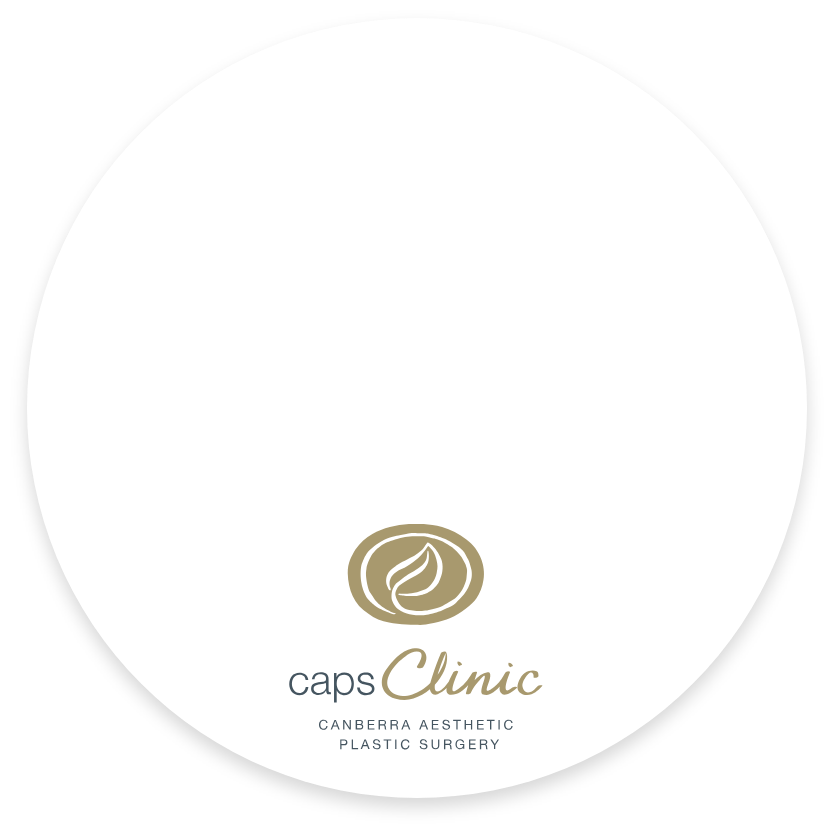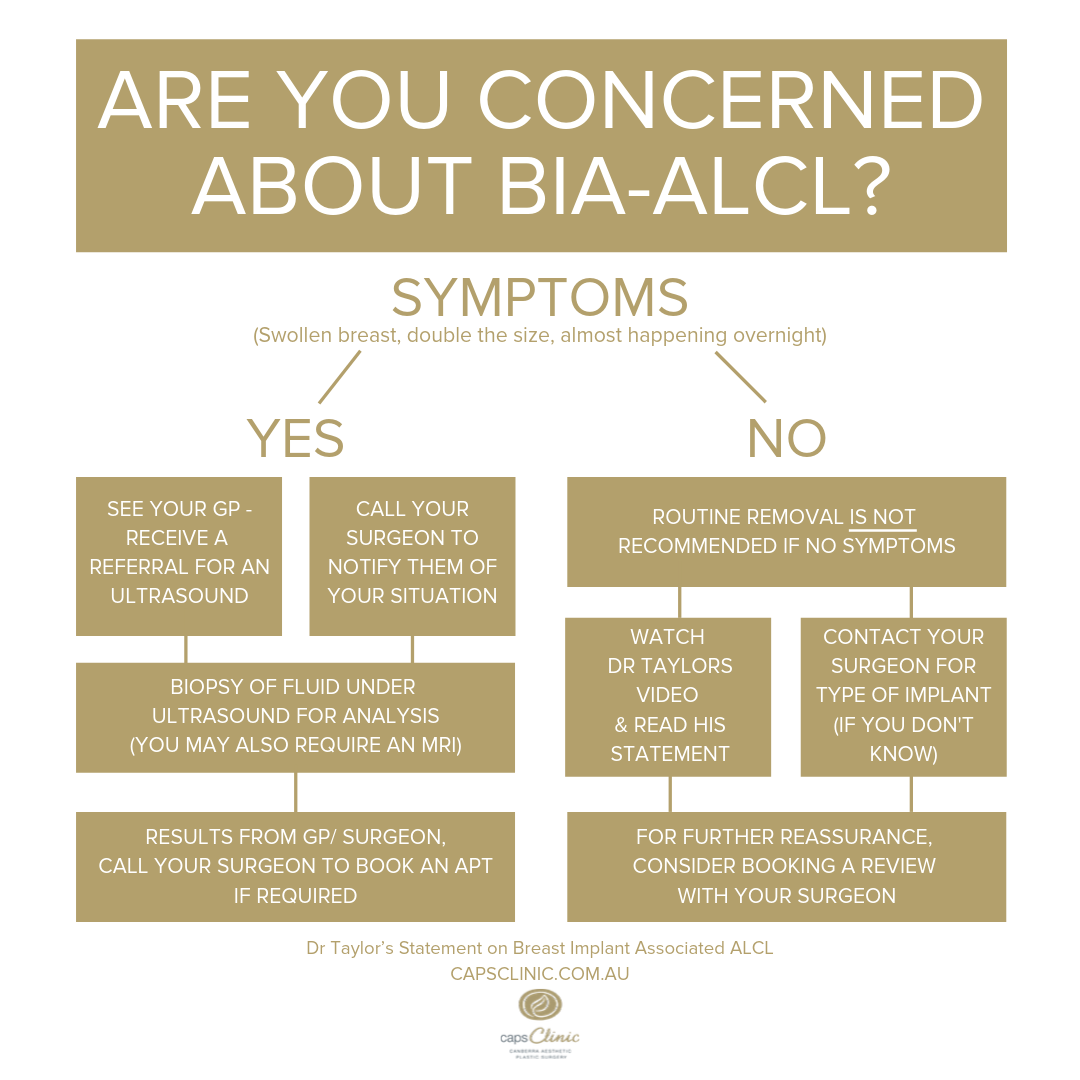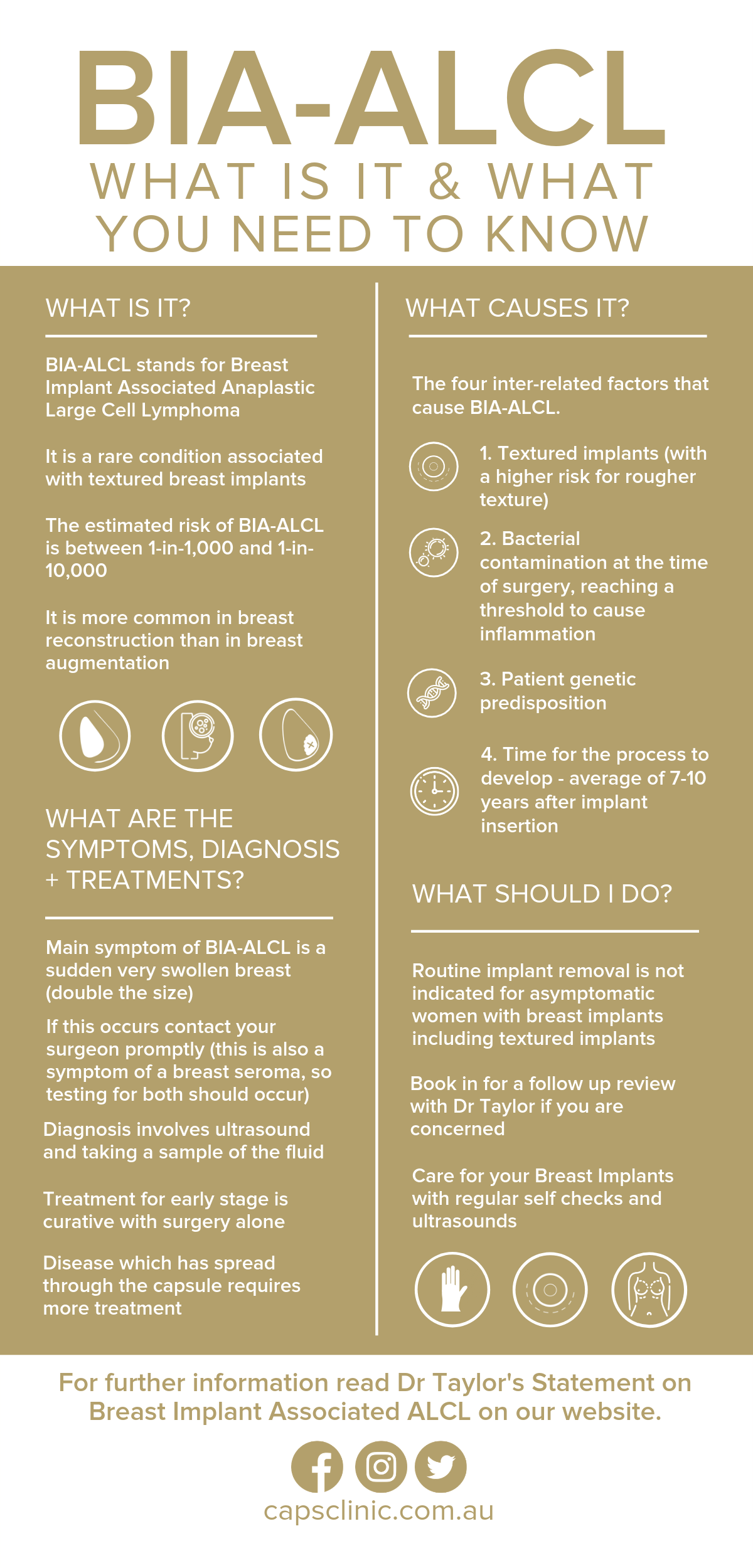
 As your health and wellbeing are our priority, Dr Alastair Taylor (Bachelor of Medicine, Bachelor of Surgery | The Fellowship of the Royal Australasian College of Surgeons | MED0001401767) and the CAPS Clinic team want to reassure our clients who may be concerned about their breast implants, and the possibility of developing Breast Implant Associated Anaplastic Large Cell Lymphoma, a rare form of lymphoma.
As your health and wellbeing are our priority, Dr Alastair Taylor (Bachelor of Medicine, Bachelor of Surgery | The Fellowship of the Royal Australasian College of Surgeons | MED0001401767) and the CAPS Clinic team want to reassure our clients who may be concerned about their breast implants, and the possibility of developing Breast Implant Associated Anaplastic Large Cell Lymphoma, a rare form of lymphoma.
All surgical procedures carry risks. Results vary and specific outcomes are not guaranteed. To learn more about the risks of aesthetic surgery visit www.capsclinic.com.au/capsclinic/plastic-surgery-risks/
Dr Taylor understands that you may be alarmed or overwhelmed by concerns raised in the media recently, around not only Breast Implant Associated Anaplastic Large Cell Lymphoma but also Breast Implant Illness. He also wants to educate you on best practices when it comes to ongoing checks of your breast when you have implants. To provide you with accurate and clear information, a video of Dr Taylor discussing breast implant information is available.
Dr Taylor is a fully qualified, trained and experienced specialist plastic and reconstructive surgeon who has placed breast implants in thousands of patients over the course of 25 years. Dr Taylor and his team are dedicated to your continued safety at any time post-surgery.
Dr Taylor is recognised as one of the first surgeons to establish and practice the 14 Point Plan in his surgery. The 14 Point Plan aims to minimise the number of bacteria that can contaminate breast implants at the time of surgery.
Learn more about the 14 Point Plan for Safer Breast Implants. Our private hospital where your surgery was performed, SoleVita Private Hospital, is fully accredited, safe and sterile, and meets all the National Safety and Quality Health Services standards.
Dr Taylor has used Allergan breast implants with a rough textured surface but the stringency of his surgery and the environment in which he operates minimises your risk of issues, no matter what implant you received. Allergan have voluntarily withdrawn their highly textured implants from sale and any stock already distributed to surgeons or clinics. There has not been a recall of implants that have already been placed in clients. Dr Taylor is using Mentor low textured (Grade 2) breast implants, and Motiva minimal textured (Grade 1) breast implants.
It is a rare type of lymphoma (not breast cancer) that is associated with bacterial contamination on the implant. Dr Taylor explains this in depth in his video. You can also read more on the Australian Society of Plastic Surgeons) website or download their factsheet here.
The factors behind Breast Implant Associated Anaplastic Large Cell Lymphoma developing for those who have had breast implants include:
Unfortunately, it is more common in breast reconstruction than in augmentation.
The risk of Breast Implant Associated Anaplastic Large Cell Lymphoma with roughly textured (Grade 3) implants is 1 in 2,800. To put this in perspective, all women have a lifetime risk of developing breast cancer of 1 in 8, whether or not they have breast implants. This risk of Breast Implant Associated Anaplastic Large Cell Lymphoma is greatly reduced if appropriate care is taken during the insertion operation.
Dr Taylor has been at the forefront of sterile implant insertion for many years.

The main symptom of Breast Implant Associated Anaplastic Large Cell Lymphoma is a very swollen breast (double the size), almost happening overnight.
If this occurs, we expect our clients to contact us and act quickly to address the concern, no matter the potential cause (this is also a symptom of a breast seroma, so we would be testing for both). You will also need to contact your GP to arrange an appointment with them, and to obtain a referral for an ultrasound.
Diagnosis requires removing some fluid from around the implant under ultrasound control and testing it for lymphoma. You may also require an MRI.
If the results are positive for Anaplastic Large Cell Lymphoma, the implant, fluid and capsule all need to be removed. If the disease is in the fluid, this will cure Anaplastic Large Cell Lymphoma. If the Anaplastic Large Cell Lymphoma presents as a mass, it needs to be removed and chemotherapy may be required. Both implants need to be removed, with the possibility that smooth implants can be inserted 6 months later.
Routine implant removal is not indicated for asymptomatic women with breast implants including textured implants.
There have been concerns surrounding Breast Implant Associated Anaplastic Large Cell Lymphoma, which has led to roughly textured breast implants being withdrawn from sale in France, Canada and now in Australia. The Therapeutic Goods Association in Australia commenced a review and are currently discussing if there is sufficient evidence to warrant regulatory action.
If you are concerned or have further questions you can email patientinfo@capsclinic.com.au or call (02) 6282 1177 to speak to our Patient Services Team Monday to Friday 8am to 5pm.

All statistics, data and information are accurate as of August 2019 as provided by Dr Taylor in this recorded presentation, and on this web page, to the best of his knowledge. This presentation and webpage are not intended to be a substitute for professional advice. A personal consultation with a qualified medical professional is necessary to discuss your specific needs, to provide professional advice and discuss methods of diagnosis, treatment, risks and possible complications of any treatment if and as these apply to you. Nothing contained within this presentation or webpage can replace a personal consultation. We do not recommend that you disregard experienced professional medical advice or delay in seeking it because of information provided in this presentation or webpage. Any surgical or invasive procedure carries risks. Before proceeding, you should seek a second opinion from an appropriately qualified health practitioner.